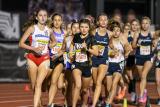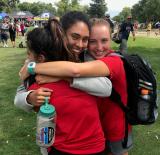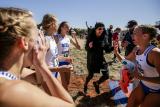Folders |
Running Issues: Women Coaches For The WinPublished by
Despite The Odds, Cross Country and Track and Field Women are Making Waves in Coaching By Elizabeth Carey for DyeStat Each year, NCAA Division 1 collegiate sports teams are assigned a grade by the University of Minnesota’s Tucker Center for Research on Girls and Women in Sport and WeCOACH, a women’s coaching organization. The grades reflect what percentage of women occupy head coach positions for women’s sports teams in 86 select, “big-time” athletic programs. Both cross country and track and field received an F, with 17.4 and 15.7 percent of head coaches being women, in 2019-20. Across all divisions of the NCAA, female head coaching positions have fallen to 40 percent since Title IX was passed in 1972, according to the Women’s Sports Foundation. At one point in the late 1970s, that figure was closer to 60 percent. Not cool. Especially in sports where women make up the majority of collegiate participants across divisions. Especially in sports where nearly half of high school participants are girls, according to data from the National Federation of State High School Associations. Especially when women continue to demonstrate talent, skills and grit as coaches yet face discrimination and complex barriers, as the Tucker Center report states. Especially when we still hear stories of toxic, abusive male coaches traumatizing athletes and bopping around coaching and industry-related gigs like the world is their oyster because it is and they are rarely actually held accountable for their actions. Against the odds, women coaches brought home a big win on Monday. Four of the top five women’s cross country teams at the NCAA championships were led by women head coaches, including one interim director. The national championship Brigham Young University squad’s head coach, Diljeet Taylor, joins a select few women who have won it. Earlier in the complex dual-championsihps weekend, Taylor also guided separate athletes to the Distance Medley Relay and 3,000-meter indoor titles. Out of the top 10 women’s teams yesterday in Stillwater, Okla., four have women assistant coaches; half list women directors of operations, largely a behind-the-scenes administrative role. In the men’s race, male coaches helmed the top 10 teams. Half list women assistant coaches and directors of operations on their staff. Even as sports with high coach turnover and director positions that oversee both men’s and women’s programs, cross country and track and field tend to fill vacant head coaching positions with men. “These hiring trends reinforce the common, but false, belief that women can’t and/or shouldn’t coach men or are not qualified to lead co-ed programs,” the Tucker Center report states. Research, such as from Tucker Center and University of Washington’s Center for Leadership in Athletics, demonstrates that women can and do make great coaches. In fact, studies suggest women are rated higher in most leadership competencies, but individual women don’t get credit from peers for exhibiting these traits while men do, as Julie McCleery, PhD, noted at the 2019 Female Athlete Conference. It’s important to celebrate wins — especially in spite of the status quo and a crazy past year — while acknowledging that wins aren’t everything. There’s so much more to coaching cross country and track and field than results at meets. Athletes are whole humans with lpotential beyond individual and team competition (See: future coaches). We know that “successful” coaches of all genders continue to embrace a win-at-all-costs approach that sacrifices the physical and mental health of athletes. Ironically and unfortunately, this approach also affects long-term performance and well-being. Talk to current and former collegiate runners and you’ll hear stories about toxic, traumatic coaching. Too often coaches have dismissed, shunned, and chronically injured athletes. Too often coaches have weighed or caliper-ed and body-shamed athletes. Too often coaches have groomed, abused and taken advantage of athletes. Too often coaches’ actions and words still sting athletes decades later. Whether “old school” coaches realize it, their archaic behaviors are unhelpful at best and harmful at worst. It’s time for a better approach. As girls and women break the mold, it’s up to all of us to help shatter the glass ceiling. So congratulations, Coach Taylor. Now, who's next? The SafeSport Helpline provides 24/7, anonymous crisis intervention, referrals, and emotional support for athletes and staff affected by sexual violence: https://www.safesporthelpline.org/ National Sexual Assault Hotline: 1-800-656-4673, https://www.rainn.org/ National Eating Disorder Helpline: 1-800-931-2237, https://www.nationaleatingdisorders.org/help-support/contact-helpline National Suicide Prevention Lifeline: 1-800-273-8255, https://suicidepreventionlifeline.org/ More news |







